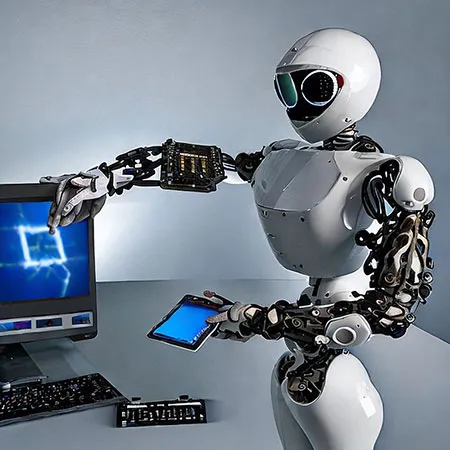Introduction
Artificial intelligence (AI) has evolved from a niche technology to a pervasive one that is transforming many aspects of our daily lives and industries. From healthcare to finance to entertainment, AI is driving innovations that were once considered the stuff of science fiction. In this post, we explore how AI is changing our world and discuss its applications, impacts, and future prospects.
1. Revolutionizing Healthcare
The impact of AI on healthcare is profound and complex. Machine learning algorithms help analyze large amounts of medical data and identify patterns that may lead to earlier detection of disease. For example, AI systems can analyze medical images with remarkable accuracy and may be better than human radiologists at detecting abnormalities such as tumors or fractures.
Additionally, AI accelerates drug discovery by simulating how different compounds interact with biological targets. This not only speeds up the development of new treatments but also reduces the costs of research and clinical trials. Artificial intelligence-based personalized medicine creates individual treatment plans based on a patient’s genetic makeup, improving treatment outcomes and minimizing side effects.
2.Transforming Finance
In finance, AI is revolutionizing the way we handle and manage money. It uses algorithms to detect fraudulent transactions by analyzing patterns and anomalies in real time, reducing the risk of financial crime. AI also powers automated trading systems that execute buy and sell orders at speeds and volumes far beyond human capabilities.
AI-powered robo-advisors provide personalized investment advice based on users’ financial goals and risk tolerance. This democratizes access to advanced financial planning, making it accessible to a wider audience.

3.Innovating Transportation
Thanks to AI, the transportation industry is undergoing major changes. Self-driving cars, a high-profile application of AI, will revolutionize the way we travel. These vehicles combine sensors, cameras, and AI algorithms to navigate roads, avoid obstacles, and make real-time decisions to improve safety and efficiency.
In addition to autonomous vehicles, AI also optimizes logistics and supply chains. Intelligent routing systems analyze traffic patterns and delivery schedules to ensure goods are transported efficiently, reducing delays and costs.
4. Enhancing Entertainment
AI is transforming the entertainment industry in exciting ways. Streaming services like Netflix and Spotify use AI to analyze viewing habits and provide personalized recommendations that engage users. AI algorithms predict what content will interest users based on their past behavior, increasing user satisfaction.
Video games are using AI to create more realistic and responsive non-player characters (NPCs), providing richer, more immersive experiences. Additionally, AI-generated art and music is pushing the boundaries of creative expression, allowing artists to explore new creative possibilities.

5. Improving Customer Service
AI-powered chatbots and virtual assistants are revolutionizing customer service by providing instant support 24/7. These systems use natural language processing to understand and respond to customer questions, efficiently handling routine queries and tasks. This not only increases customer satisfaction but also frees up human agents to focus on more complex issues.
AI can also analyze customer feedback and behavior to help businesses customize products and services. Understanding customer preferences and issues helps businesses improve their services and build stronger relationships with their customers.
6. Addressing social and ethical implications
The rise of AI raises noteworthy societal and moral concerns. Protection concerns are vital, as AI frameworks regularly require get to to huge sums of individual information. Guaranteeing that this information is utilized capably and secured from breaches is key.
The affect of AI on work is another concern. AI can computerize numerous assignments, progressing productivity and diminishing costs, but too possibly killing employments. To moderate the negative impacts, it is vital to plan workers for this alter through instruction and preparing.
Moral contemplations when creating AI incorporate guaranteeing reasonableness and straightforwardness within the decision-making handle. As AI frameworks ended up more autonomous, it is critical to set up rules and benchmarks to maintain a strategic distance from inclination and guarantee responsibility.
7.Looking to the Future
The long run of AI is full of conceivable outcomes. Modern innovations such as quantum computing have the potential to enormously increment AI’s capabilities, making a difference it unravel complex issues quicker and more effectively. Propels in common dialect handling seem move forward human-AI interaction, making frameworks indeed more natural and responsive.
Potential applications of AI run from savvy cities that optimize urban life to AI-driven natural arrangements to combat climate alter. As we proceed to investigate these conceivable outcomes, it is critical to adjust development with moral contemplations and societal impacts.
Conclusion
Counterfeit insights is without a doubt changing our world, driving advance in numerous segments and changing our ordinary encounters. As we move forward, it is critical that we tackle the control of AI dependably to maximize its benefits whereas tending to the challenges it postures. The AI journey is as it were fair starting, and AI’s potential to move forward and enhance our lives is constrained as it were by our creative energy and moral contemplations.


